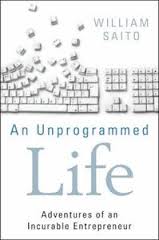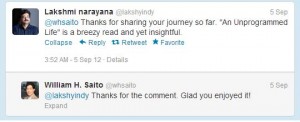“I too had a dream” is an excellent memoir, of a nationalist entrepreneur, Dr.Verghese Kurien.
( Wikipedia article http://bit.ly/QrsWgr)
Here are some quotes picked up from the last chapters of the book, where he summarizes his ideas on leadership, management and his life in general.
- “What is the primary job of an excellent manager? In my book, it is to bring in and groom the right people on the team. Once this is done, the manager must then groom the successor most appropriate for the institution”
- “While integrity and loyalty are core values, there are other values too, which are a prerequisite to achieve success in any field. For example, the leader has to set a personal example and make others understand in what ways ‘change’ is going to be useful. I believe that professionals working in our organizations must have a clarity of thought combined with a passionate pursuit of mastery of their subject. I have always emphasized that large endeavors are only the sum of many small parts and, therefore we must keep in mind not just where we are going but how we are going to reach there successfully. I also believe that a person who does not have respect for time, and does not have a sense of timing, can achieve little.”
- “As I never tire of saying, my colleagues did all the work and I collected all the awards.”
- “I remember often explaining to Nirmala that it is terrible to have too little money because you will not even have enough to eat and appease your hunger. But it is far, far worse to have too much money because then you will surely get corrupt.”
- “I may be old fashioned in my thinking but I have always believed that it is only when you get less than you are worth, that you can look for respect; if you are paid much more than you are worth you will get no respect.”
- “Bureaucracies do not exist only in Governments. Tragically, most institutions given time and allowed to grow big, tend to get bureaucratized. When employees begin to believe that the institutions exist for them, rather than that they exist for the purpose and ideals for which the institution was built, then clearly that institution has mutated into a bureaucracy. The revolutionary in me would demand that such an institution be broken down unabashedly, and built again anew.”




